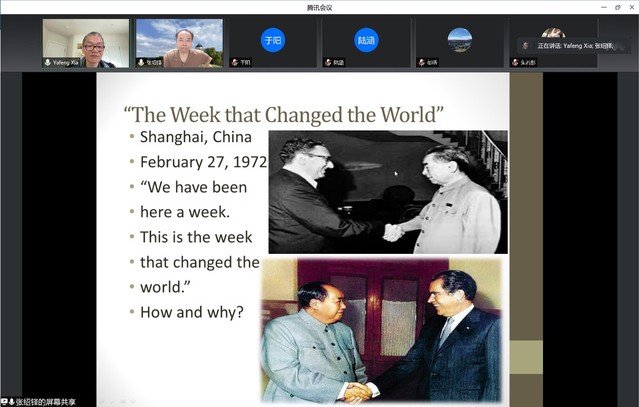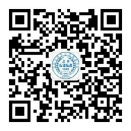To facilitate communication between the faculty and students worldwide, the School of International Relations and Public Affairs (SIRPA) at Shanghai International Studies Univeresity (SISU) launched a dialogue series for presenting China’s stories globally. It’s named as Zhaomingde [昭明德], borrowed from Chinese classic The Book of Changes, interpreted in English as “a gentleman demonstrates his virtue by practicing it, just as the sun shows its brightness by sunrise”.
In December, 2021, the first dialogue focused on “China’s Development in My Eyes” was held in Songjiang campus by the CPC Committee of SIRPA, under the guidance of the spirit of the Sixth Plenary of the 19th CPC Central Committee and as one of the activities held to celebrate the centennial anniversary of the founding of the Communist Party of China.
On the evening of 19 May 2022, SIRRAof SISUinvited ProfessorYafeng XIA to give a lecture on the theme “The Week that Changed the World:Nixon's Trip to China in February 1972.”
Yafeng XIA is a senior professor of social sciences at Long Island University, Brooklyn.
First of all, Professor Xia analyses the Historical Context of U.S.-China R relations between 1945 and 2021:1) 1945-1949,the U.S. was friendly to the Chinese Nationalist government;2) 1949-1969,the U.S. was hostile to the Chinese Communist government in Beijing;3) 1969-1989,the U.S. and China were“tacit alliance (together against the Soviet Union);4)1989-2010,the U.S.and China cooperated with each other while competing/conflicting(conflicting in ideology while cooperating in economic sphere)Since 2010,becoming more hostile and confrontational in ideological economic and technological spheres.
In addition, Professor Xia analyzed the reasons why U.S. and China move towards rapprochement. The Sino-Soviet split, the Second Taiwan Strait crisis of 1958, Mao-Khrushchev meetings of September/October 1959, the withdrawal of all Soviet advisers from China(1960), and the border tensions-the Soviet Union began military buildup since mid-1960s, threatening China with a pre-emptive strike”(March 1969) lead to the triangular politics.

In October 1970 the American journalist Edgar, Snow who visited China for six months was invited to inspect the National Day parade on the Tiananmen Square. Mao Zedong and Zhou Enlai told Snow that the Sino-American difficulties could only be obviated through direct negotiations and he would welcome a visit by Nixon as president or tourist.
The Ping Pong diplomacy further improves relations between the two countries. in April 1971, Mao Zedong invited the U.S. table-tennis team to visit China; During the warm reception, Zhou emphasized the importance of people-to-people diplomacy and remarked that he was confident that“this beginning again of our friendship will certainly meet with the support of our two peoples.
Nixon's visit to Beijing was fully prepared. Firstly, Kissinger secretly visited Beijing on July 9-11,1971. Secondly, Zhou Enlai identified Taiwan as the top priority
Thirdly, The main priority in July 1971 was how to word the announcement of Nixon's trip to China. Both sides eventually agreed to the following,“Knowing of President Nixon's expressed desire to visit the People's Republic of China, Premier Zhou 'has extended an invitation. Fourthly, about the Timing: The Chinese preferred the presidential visit to take place in the summer of 1972, in the hope that Nixon would go first to Moscow, but finally agreed to a date in the spring of 1972. On Taiwan, Kissinger came up with the following formula,“The United States acknowledges that all Chinese on either side of the Taiwan Straits maintain that there is but one China. The United States Government does not challenge that position. Finally, Alexander Haig's advance team made detailed arrangement for the presidential visit such as places for photo opportunity. In April 1973 an advance group from the State Department traveled to Beijing to establish a liaison office. On May 14 David Bruce the 75-year old former ambassador to London Paris and Bonn entered China as head of U.S .Liaison Office China established a liaison office in Washington D.C.and Huang Zhen as head of China's Liaison Office. Japan immediately normalized relations with China; Moscow invited Nixon to visit the Soviet Union. Nixon decided to go in May 1972 just three months after the trip to Beijing
Last but not least, Professor Xia analyzed the historical significance of Nixon's visit to Beijing.1) It changed the international geopolitical chessboard. China switched side in the U.S.-Soviet Cold War confrontation. Although the Cold War did not end until the late 1980s and early 1990sone of the most crucial roots of the collapse of the Soviet Union and Communist rule in Eastern Europe certainly can be traced to the Mao-Nixon summit and the U.s.-China rapprochement in the early 1970s.2) It changed world political economy bringing China to U.S.-established/dominated world market. The long-term effect and historical value of Nixon's opening to China is thay China’s phenomenon rise in the last 40 years.3)Many emphasize the successes most notably, the establishment of relations with China, and view Nixon and Kissinger as the most innovative and realistic U.S. policymakers since the early days of the Cold War.
Following the talk, students raised a number of questions about Nixon’s Trip to China andProfessor Xia explained the reasoning behind the wording.
SIRPA houses the largest number of international students at SISU, with two master’s degree programs taught all-through in English, International Relations and China Studies. The school is committed to preparing future global talents for a wide range of international expertise. The Zhaomingde dialogue series was a platform for both Chinese and international students to have a better understanding of contemporary China and tell Chinese stories globally.
By Zhao xian





